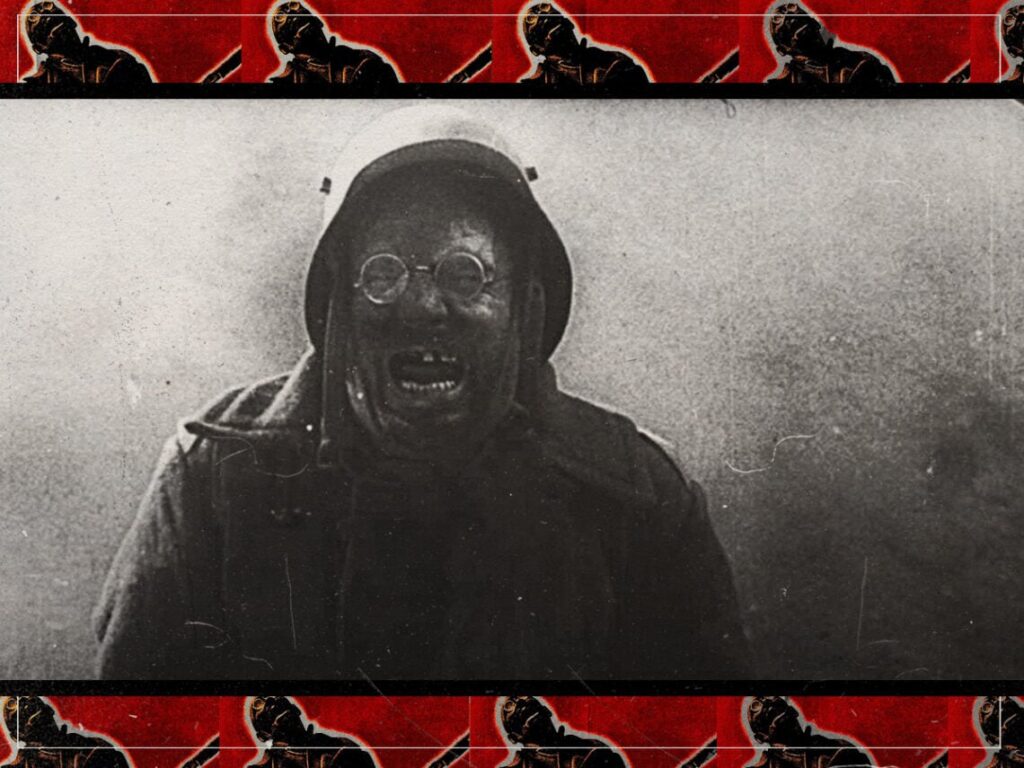Arsenal: The Soviet anti-war film that caught the attention of Joseph Stalin
 Posted On
Posted On
(Credits: Far Out / MUBI)
Artistic expression can be a difficult thing to achieve under a totalitarian regime. While the early period of the Soviet Union was characterised by a renaissance of avant-garde and radical art – akin to that of the Weimar Republic in Germany – as the Soviet state became more authoritarian and overbearing, the art and cinema of the USSR became very limited. In terms of early Soviet cinema, there are few films as striking as Alexander Dovzhenko’s 1929 film Arsenal.
The second instalment in Dovzhenko’s trilogy chronicling the development of Ukraine before and after the great revolution of 1917, Arsenal is as harrowing as it is important. In its essence, the silent film is an anti-war tale, centring around Timosh, a young Ukrainian returning from the frontlines of World War I to find his home nation ravished by conflict. After being inspired by the poverty and deprivation caused by a capitalist system, Timosh joins the Bolshevik movement and begins preparing for an uprising against the bourgeoisie.
Based around the events of the Kyiv Arsenal January Uprising in 1918, which saw workers join forces with the Bolshevik army to overthrow the capitalist Ukrainian People’s Republic, the film is often misconstrued as a propaganda piece espousing the brilliance of the revolution. In actual fact, Arsenal is not a substanceless movie meant to instil nationalistic pride and power within the workers – akin to something like Alexander Nevsky. Instead, it presents war and violent revolution as an inherently horrific thing, which is detrimental to the lives of ordinary people and the surrounding lands of Ukraine.
In fact, Arsenal is one of the few early Soviet cinema features that does not provide a one-dimensional view of conflict. For instance, at one point in the film, soldiers bombard what turns out to be an empty trench, lamenting the ridiculousness and futility of war. Despite the bare-chested, triumphant finale of the film, Arsenal is certainly not a joyous celebration of the glorious Bolshevik revolution. By the end, Timosh is battered and bruised, with sunken eyes and dishevelled clothes; the only thing that keeps him going is a revolutionary spirit.
Arsenal presents a stunningly bleak and violent portrayal of war, unmatched by any modern war film rife with big budgets, special effects and all the rest of it. Almost a century since it was made, Dovzhenko’s film remains haunting, moving and, at points, frightening – helped along by the inclusion of real-life documentary footage of the conflict. But alas, as the censors of the Soviet state became harsher as Stalin’s premiership intensified, the initial praise that Dovzhenko received for Arsenal soon turned to resentment by the state.
The post-war period saw virtually all forms of artistic autonomy decimated by Stalin and the Soviet state. In the latter part of the 1940s and into the 1950s, very few films were produced as filmmakers struggled to grapple with the state censors. However, even before the post-war tightening of control, Dovzhenko found himself in Stalin’s bad books.
Clearly not bowled over by the anti-war stance of Arsenal and the wider ‘Ukraine Trilogy’, the state took aim at the director’s next project, Ivan. Accused of promoting fascism, the director was summoned to Stalin and forced to make a case for his film. Though he got away with Ivan, Stalin ‘suggested’ that his next project should centre around the communist guerrilla fighter Mykola Shchors. The film did eventually come to fruition in 1939, but not before the director was again criticised for not portraying the communist regime in a positive enough light. In a pleading letter to Stalin, fearing for his life and position, he wrote, “This is my life, and if I am doing it wrong, then it is due to a shortage of talent or development, not malice.”
For the rest of his career, the film director lived in constant fear of the Soviet state. Many of his colleagues and friends had been executed or exiled during The Great Purge. While Dovzhenko managed to keep his life by making films that pleased the state, much of his work was dictated by revisions, censorship, and a general lack of creative control. With the death of Stalin in 1953, the persecution of the director lessened, but he failed to complete any new projects before his own death in 1956.
[embedded content]


